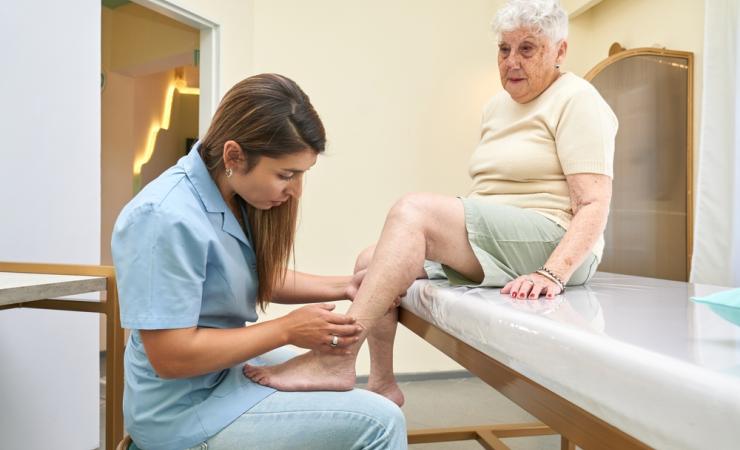Arthritis is caused when the immune system attacks the body’s own healthy cells, resulting in painful inflammation, especially around the joints. This disease affects 18 million people worldwide, there is no cure, and current treatments involve soothing the symptoms and trying to slow the progression of the disease.
A new experimental treatment called autologous tolerogenic dendritic cells is targeting the problem at its source, attempting to re-train the immune system to recognise the body’s cells and halt the attacks. This treatment involves manipulating the patient’s own white blood cells and re-injecting them, with special instructions telling the immune system to cease attacking the rheumatoid joint.
The treatment was initially tested using fluid from a knee joint in the original AUTO-DECRA trial, and now a new trial - AUTO-DECRA-2 - will test whether other entry points on the body might work better, relying on results from the IMI RTCure project to evaluate each site’s performance. Both trials were funded by Versus Arthritis, a UK-based charity that finances research into arthritis as well as providing information and support to both patients and healthcare workers dealing with this disease.
“We’re looking at three different routes for administration,” says John Isaacs, Professor of Rheumatology at Newcastle University, who is leading the AUTO-DECRA-2 trial and also led the IMI RT-Cure project’s work on improving clinical studies for arthritis. “Under the skin beside the thigh, the lymph nodes and the original site, the knee. The lymph nodes are where the immune system makes decisions so we think the lymph nodes are where the money is right now.”
The differences in the immune responses to the various administration routes might be very slight, and often patients don’t experience shifts in their symptoms over the short term. The AUTO-DECRA-2 trial needed a biochemical method to indicate which administration route yielded the best results, and the immune monitoring outcome measures developed by the RT-Cure project were a perfect fit.
“The difficulty with these types of therapies is that we don’t necessarily expect them to have an effect on symptoms in the short term. The immune monitoring outcomes that were developed in RT-Cure can help to try to understand whether or not these treatments are having an impact,” says Isaacs.
These outcome measures are immunological signals, or biomarkers, that indicate whether the immune system is retreating or inflammation is decreasing. They provide important insights into how the body is likely to react or respond in the future, signalling that a person’s arthritis will become worse or – hopefully – get better.
“I often make the analogy with blood pressure,” says Isaacs. “We use blood pressure drugs to prevent heart attacks, but if we couldn't measure blood pressure, we would really struggle to develop drugs to prevent heart attacks – because the heart attacks in question are many years down the line.”
Throughout the course of the AUTO-DECRA-2 trial, the participants’ blood will be analysed and tracked for these immune outcome measures to indicate the performance of the treatment. A comparison can then be made to see which groups of patients are seeing improvements in their immune system functioning.
RTCure’s remit was to investigate whether rheumatoid arthritis could be prevented from progressing at the early stages by using so-called ‘immune-tolerising treatments’, where the immune system is taught to switch off and stop firing against the body’s own cells. This new treatment is an example of an immune-tolerising treatment and so the results of RT-Cure have been highly applicable for the AUTO-DECRA trials. RTCure support helped to establish the procedure of aspirating cells from lymph nodes (needed for biomarker analysis) as well as the procedure for injecting cells into lymph nodes as a treatment route.
“Before we started this trial, we had to show that we could get cells from lymph nodes and get some meaningful measurements. RTCure funded that work,” says Isaacs.
One major advantage of injecting into the lymph nodes is that a lower dose of the medication might achieve the same result. This is especially interesting for patients because currently the process for harvesting the cells used to manufacture the new treatment is inconvenient – it involves being hooked up to a machine for 2-3 hours while your blood is removed. The use of a lower dose could theoretically allow manufacture using a standard blood donation - a much less daunting procedure.
The public-private partnership framework of RTCure helped the AUTO-DECRA-2 trial researchers to better understand how patients would feel about injections into the lymph nodes, knee joints and thighs. Knowing whether a treatment will be accepted by patients is vital to evaluate its ultimate uptake once on the market, and the patient organisations involved in RTCure provided useful insights.
“We got very positive feedback,” says Isaacs. “Most people with arthritis are happy to undergo these sorts of manoeuvres. People are used to injecting themselves with medicines now – it’s not how it was 10 or 20 years ago, when everything was pills or tablets.”
RT-Cure is supported by the Innovative Medicines Initiative, a partnership between the European Union and the European pharmaceutical industry.

